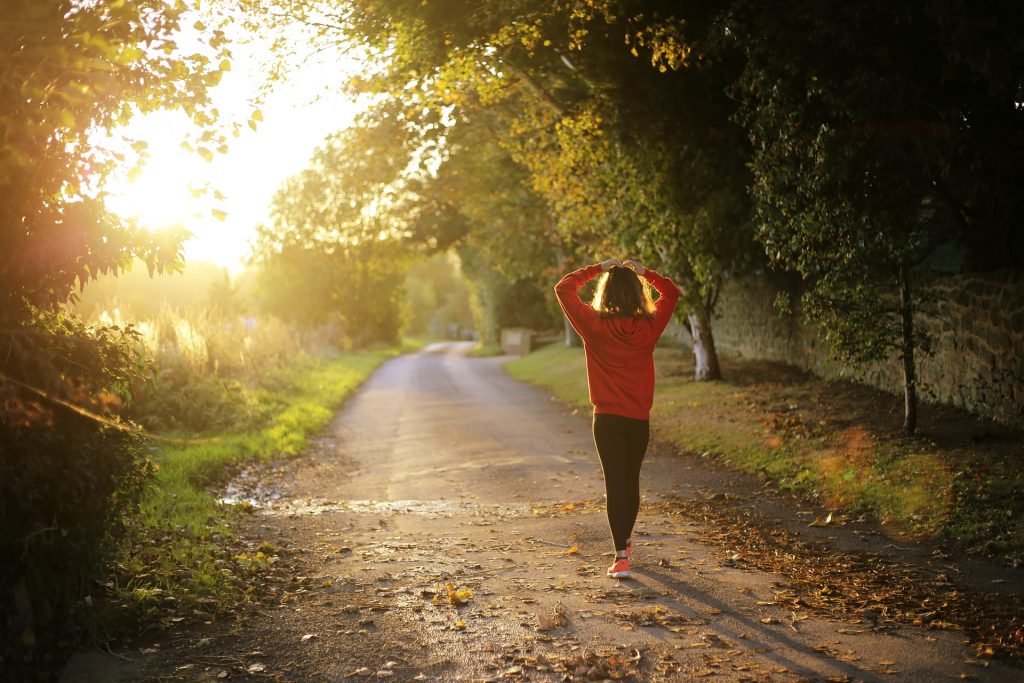Brisk walking could become one of the most popular pastimes in the UK this year.
To be fair, walking for exercise has been forced by the Covid-19 lockdowns, but now Brits are getting out and about, we suspect people will start to recognise the benefits of walking.
Brisk walking has a number of benefits and can reinvigorate your energy levels. It’s one of the best exercises to do for both mental and physical health because it doesn’t impact your bones and joints like contact sports and other forms of exercise such as running, for example.
Health experts say that walking 20 minutes a day can even help to keep weight off. However, the optimum number of steps that deliver the highest health benefits is 750 – about 2 and a half hours of walking at a normal pace.
Brisk walking can shave a good 45 minutes to an hour of that time and burn even more calories. Below we outline some of the reasons why brisk walking will benefit you in 2021.

Brisk Walking Helps You Lose Weight
When combined with a healthy diet, regular brisk walking can do wonders for your weight loss efforts. Fitness walking naturally burns more calories than casual walking and helps you to get rid of the excess flab around your hips and abdomen.
The number of calories you burn whilst brisk walking depends on your weight and speed. For example, someone that weighs 180lbs walking at a 2mph will lose around 204 calories whereas someone that weighs 130lbs walking at the same speed will only steam off 148 calories.
Other factors to account for are whether you are walking on a flat surface or an incline. Walking uphill means you expend a significant more amount of energy. Estimates indicate you could lose an additional 130-200 calories walking uphill even when covering the same distance as a flat surface.
Healthline has published a table you can use as a rough guide.
Fitness experts also show that changing the pace of your walking helps your body burn fat quicker. This involves walking at a reasonably moderate pace for the bulk of the course, then throwing in two or three power-walking intervals. Try and keep the power-walking going for 5-10 minutes.
Walking Improves Blood Circulation
Lack of exercise is cited as one of the biggest contributors to poor circulation. If your cardiovascular system does not function well, your body does not receive a sufficient supply of oxygen and nutrients it needs to remain in a healthy condition.
The British Heart Foundation shows heart and circulatory disease is the biggest killer in the UK. Accounting for some 170,000 deaths a year, poor circulation is the cause of 27% of all UK deaths.
According to the latest guidance, engaging in physical activity can significantly improve your blood circulation and reduce your risk of coronary heart disease by 14%.
Reduces Risk of Diabetes
The global diabetes community – Diabetes – reports that a daily 30-minute walk has been shown to improve blood sugar control and help reduce the risk of type 2 diabetes.
Moderate exercise can lower HbA1c values by around 0.7%. Researchers found this was the case regardless of age, ethnicity, diet, weight or the type of medication you might be taking.
In addition, resistance training combined with brisk walking exercise helps to lower insulin resistance in adults with abdominal obesity. Experts say combining the two is proven to be more beneficial than doing one or the other.
For people that do have diabetes, the best time to exercise is one to three hours after meals. This is when your blood sugar levels are most likely to be higher.
For individuals that use insulin, it’s important to test your blood sugar before exercising. If insulin levels are under 100mg/dL before you exercise, eat a piece of fruit or a snack to help avoid hypoglycemia. Test again, 30 minutes after exercising to ensure your blood sugar level is stable.
Brisk Walking Boosts General Wellbeing
Researchers from the University of Connecticut (UConn) found that leisurely walks are better for your psychological wellbeing than pumping iron in the gym for an hour.

The lead study – published in the Journal of Health Psychology, concluded that walking can improve the mood of adults who work in sedentary jobs.
Whilst it is well-known that all forms of physical activity are good for mental health, the Connecticut study examined whether the intensity of physical exercise had any bearing on subjective well-being.
Participants of the study were asked to perform various exercise routines ranging from moderate to intense. They were then asked to provide feedback about their psychological and physical wellbeing, level of depression, and severity of any pain they were feeling.
Brisk walking was among the top exercise routines for psychological wellbeing without any experience of pain. Researchers at the University of Georgia found similar results in which participants said they felt more energetic and less fatigue after a 20-minute walk.
Improves The Efficiency of Your Immune System
A recent review published in the Journal of Sport and Health Science has linked inactivity and obesity with poor immune response. In contrast, people that lead a healthy lifestyle produce more immune blood cells that enable their body to ward off illness and disease.
The review found that moderate exercise such as brisk walking for 30 to 60 minutes a day can improve your body’s immune system. Exercise gets more oxygen into your lungs which feed into your heart and produces more white blood cells to be distributed around your body.
The immune system plays a critical role in defending the body against foreign invaders such as bacteria, fungi and viruses – including the novel coronavirus that has rocked the world. If there was ever a time to take up brisk walking as your daily exercise routine, it’s now.
Helps You Sleep Better
Researchers at Harvard University School of Medicine confirmed that going for a brisk daily walk releases melatonin and helps you get a better night’s sleep. The study found that women who exercised fell to sleep easier than women that exercised less often.
It was found that people who perform 20-30 minutes of moderate exercise every other day fell to sleep 50 per cent quicker and stayed asleep up to one hour longer.

However, the time of day you exercise will have a bearing on your sleep patterns. Experts recommend a brisk walk in the morning is the most ideal time because you have exposure to sunlight which helps the natural circadian rhythm.
If you exercise at night bedtime, however, it can energise you and keep you awake.
Brisk Walking Increases HDL Cholesterol Levels
Cholesterol is a fatty substance that circulates in our blood. Too much of it narrows the arteries and increases the risk of cardiovascular disease.
However, it’s not the amount of cholesterol in the blood that is the risk factor, but the type of protein that carries the cholesterol through the body. There are two types: Low-density lipoprotein (LDL) and High-density lipoprotein (HDL).
HDL protects the body from cholesterol building up. Too much LDL, on the other hand, is where potential problems can start. Researchers found that physically active men and women have significantly higher levels of HDL cholesterol than the test cases that did not exercise.
Meet New Friends
If covid-19 related lockdowns and deaths continue at the current rate, depression rates among Brits could worsen. The BBC reported that 2020 had a major impact on mental health throughout the UK – including higher rates of suicidal thoughts.
Scientists from the University of Sheffield has found that depression levels in the UK increased by 52% during the first lockdown phase in 2020. The longer the pandemic drags out, 2021 could see even higher numbers of people falling into chronic depression even once everything returns back to normal.
Symptoms of depression include persistent sadness, loss of appetite, and disinterest in socialising or physical activity. Eventually, depressed people refrain from any activity at all.
Whilst exercise can alleviate symptoms of depression, brisk walking alone will not change your outlook on life. If you feel you are losing hope or lockdown is making you lonely, consider joining a walking club – it’s a great way to meet new people.
Walking groups keep you motivated to go for walks regularly. Not only do they promote a healthy lifestyle, but also give you an opportunity to socialise at a safe distance.
Downloading the Sweatcoin app can also serve as a motivator to go walking. The app records the number of steps you make and converts your efforts into digital tokens known as SWC.
You can use the digital coins to earn an extra income and receive discounts of 100’s of merchandise offered by contributing retailers. Brisk walking may only make a small difference to your store of wealth but it makes a massive difference to your buildup of health. And that’s arguably the best reason to start brisk walking in 2021.


